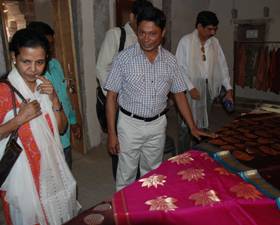
When you ask a software engineer like Shahid Ahmad about Jacquard weaving, the answer would stump many a fashion designer. “It is actually the world’s oldest binary system,” says Ahmad of Digital Empowerment Foundation (DEF). He has even devised a Jacquard card punching machine that eliminates two weeks of manually punching a card with the binary sequence to an hour’s work. And the weavers of Chanderi village in Madhya Pradesh are rejoicing.
Ahmad’s tryst with the age-old traditional weaving business of Chanderi began when it was gasping on its last breath. It started off with a 2008 basic survey of Chanderi village on the instigation of Jyotiraditya Scindia when Ahmad had gone to invite him for a DEF function.
The survey threw up distressing facts: weavers were being treated as labourers and earned a pittance; a few businessmen controlled the market; there wasn’t much demand for the products in the market and the youngsters were migrating to cities. Ahmad decided to give the ancient craft and its craftsmen a shot of digital empowerment. Thus was born Chanderiyan, a programme that has transformed the ancient weaving village of Chanderi.
Ahmad eased the bottleneck in the designing process (which was done manually by a couple of designers on graph paper). “I wanted to speed up designing and other aspects of the business while retaining the traditional looms,” he recalls. He also wanted to increase the earning capacity of the weavers, which was then at Rs 2000 a month.
He customised the CAD CAM software and trained 20 weavers in using the software. Of these, three to four weavers were selected to train a further 100 weavers. Simultaneously, a design library was created with 10,000 traditional designs, some retrieved from old saris.
Digitisation gave the weavers a chance to create designs and replicate the same in the loom quickly. It also allowed them to visualise new colours and create contemporary variations without having to waste precious man hours. The demand for Chanderi saris increased as the market saw newer designs and faster supply. Today, the weavers earn at least Rs 10,000 per month. The business turnover, according to an IIM Calcutta survey is anywhere between Rs 65 crore to 100 crore.
Ahmad has now taken his big idea a step further: he has devised an e-portal (Chanderiyaan.net) wherein weavers can sell their products directly to the customers globally. He also trained the weavers in aspects like taking photographs of their products, sending couriers etc. He also put up Wi-fi in a five kilometer radius. “From raw materials pricings to what exhibitions are on, the youngsters can now take their own decisions,” says Ahmad.
His dream is to make the weavers the future businessmen of Chanderi. Ahmad admits to now being more of a textile engineer than a software engineer; he even trains NID students from Bhopal on the technique of Jacquard weaving. He might not be familiar with colours, warps and weaves, but he sure knows his binary system.
source: http://www.bangaloremirror.com / Bangalore Mirror / Home> Work / by Jayanthi Madhukar, Bangalore Mirror Bureau / January 21st, 2014








